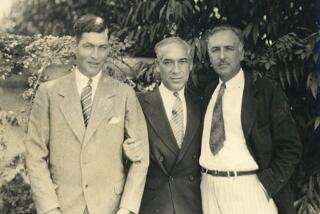Remembering Horton Foote
If one were to choose a single phrase to distill the essence of Horton Foote’s distinctive literary grace, the title of the 1983 film for which he won an Academy Award for screenwriting, “Tender Mercies,” could hardly be bettered. For it is this quality of loving forbearance that characterizes his relationship to all those everyday eccentrics from Texas backwaters he introduced us to -- that colorful, twangy crew who wear their hearts as well as their foibles on their sleeves.
Foote, who died Wednesday less than two weeks shy of his 93rd birthday, revealed to us again and again in a career spanning several generations in theater, film and television that a small scope needn’t imply a shallow soul. No matter how conniving, gossiping or suspicious those denizens of Harrison, Texas -- the name he bestowed on his hometown of Wharton to protect the privacy of friends, family and neighbors -- may have been, they were never insentient to the poetry of loneliness and loss, which were Foote’s twin themes and the ground that made him an American Chekhov.
One could be forgiven for thinking that this gracious and dapper Southern original would last forever. Speaking with him last fall in New York before a matinee of “Dividing the Estate,” his 1989 drama, I was pleased to find the same gentlemanly twinkle in his eye. Although he needed a cane and a strong arm to get around, he was delighted to be back on Broadway, especially in a production that showcased the ripe comic talent of his daughter Hallie Foote.
Proud father that he was, Foote couldn’t help confiding to me that the sight of his daughter onstage put him in mind of the brilliance of Geraldine Page and Kim Stanley, two actors who illuminated the lyrical humanity of his writing. In the ‘50s and ‘60s, Stanley starred in a number of Foote’s dramas, on television and in the theater, including “The Traveling Lady” and “A Young Lady of Property,” while Page won an Oscar for her portrayal in “The Trip to Bountiful” of Carrie Watts, the elderly mother cramped in a Houston apartment who desperately wants to return to her rural hometown before she dies.
Foote learned a great deal from working with actors of this caliber, and he gave much to them in return. Not surprising for a writer so faithful to a traditional well-rounded sense of character, Foote came to playwriting via acting. After studying at the Pasadena Playhouse theater school in the ‘30s, he moved to New York, where he became a founding member of the American Actors Company. It was there that the dancer and choreographer Agnes de Mille, who had been doing improvisational exercises with him, encouraged him to pursue writing. Quickly, Foote’s ability as a dramatist overshadowed his ability as a performer, but he never forgot that the heart of the theatrical experience is the flesh-and-blood actor willing to expose all for our collective enlightenment.
Foote’s dramatic method could strike some as pedestrian -- avant-garde he most certainly wasn’t -- and his subject matter might seem overly circumscribed, especially to those who judge a work by grand themes rather than poignant depths. He adored innovators -- dancer and choreographer Martha Graham especially -- but as an artist, he decided to stick with what he knew best, which meant carpentered realism inspired by his small-town Southern past.
“I didn’t choose it,” he explained to me about his career as a playwright. “It chose me, and I’m only doing what feels comfortable.”
That comfort was experienced primarily in the theater, where he won a Pulitzer Prize for “The Young Man From Atlanta,” along with countless other accolades, though it’s not every playwright who’s also a two-time Oscar winner (the first being for his adaptation of Harper Lee’s “To Kill a Mockingbird”). “I do think of things that would make a good film,” he told me. “But the first thing that comes to my head is that ‘this would make a good play.’ ”
Foote was thrilled by the prospect of having “The Orphans’ Home Cycle,” the series of nine plays he wrote after the death of his parents and which many consider his masterpiece, produced in its entirety by Hartford Stage in Connecticut and New York’s Signature Theatre Company later this year and next. But he remained as ambitious as a dramatist just getting his start to write “a wonderful new play.”
The truth is that every time an actor steps into one of Foote’s characters, something wonderful has the potential to occur. Behind this remarkable longevity is a reverence for the interior life, that fortress of consciousness in an inexplicable wilderness, and a compassion for all of those courageous enough to confront the confounding reality of their being.
More to Read
The biggest entertainment stories
Get our big stories about Hollywood, film, television, music, arts, culture and more right in your inbox as soon as they publish.
You may occasionally receive promotional content from the Los Angeles Times.







